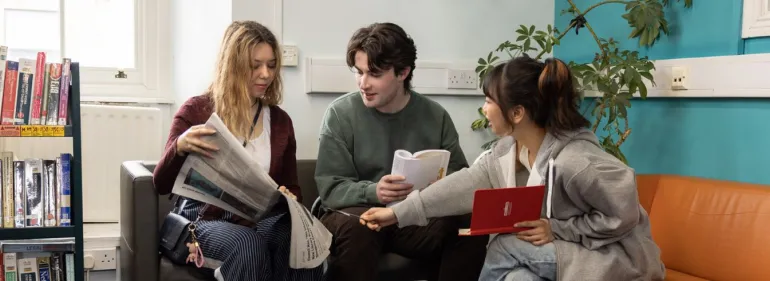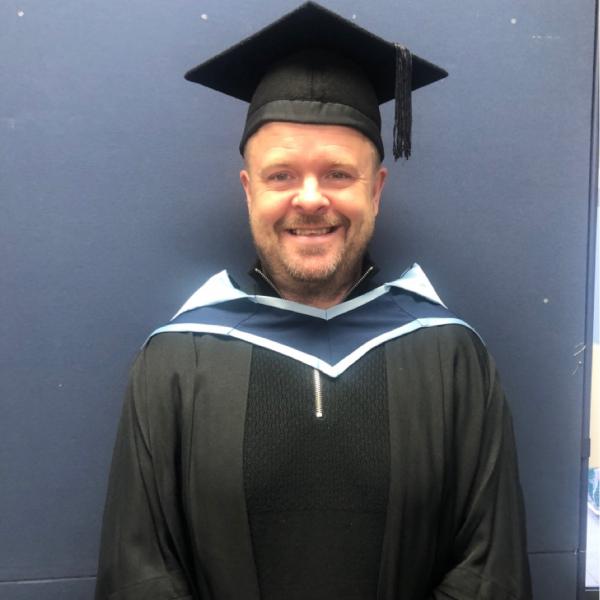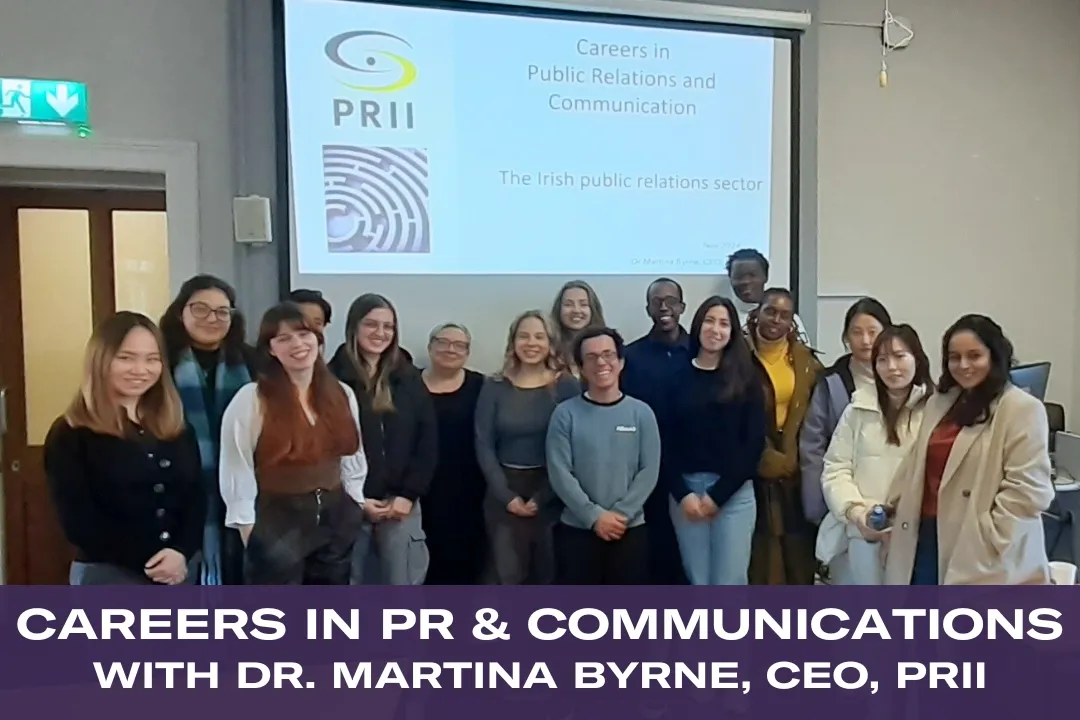Master of Arts in Public Relations and Digital Communications

Course Overview
Realise your creative potential and develop key media industry skills to specialise in public relations
The MA in Public Relations and Digital Communications is accredited by the National Union of Journalists (NUJ) and the Public Relations Institute of Ireland (PRII). The programme is delivered on a full-time and part-time basis by academics and industry experts in the fields of public relations, communications, business and journalism.
The MA in Public Relations and Digital Communications provides students with a well-rounded internationally recognised communications qualification that prepares them for careers within the communications, media and public relations industries.
Why Study Public Relations and Digital Communications at Griffith College?
The MA in Public Relations and Digital Communications is recognised by the National Union of Journalists (NUJ) and the Public Relations Institute of Ireland (PRII).
The curriculum is structured to increase the employability of students and promote professional development in the communications sector. The course is conducted on both a full and part-time basis over a 1-2 year period. Learners will acquire the skills to conceive, produce and edit their own media and public relations content on all platforms including web, social, radio, print and mobile video.
Public Relations students will develop a critical understanding of the theory and practice of public relations, political communications and the strategic role that communications play in the management of organisations. The programme has been designed in response to industry demands for well-rounded multi-skilled communications graduates.
- You will gain a theoretical understanding of the workings of the media industry including Sociology of the Media, Communications and Audience Theories and Research Methods.
- You will develop specific skills in journalism production through the Writing & Editing, Radio and MoJo modules, participating in Newsdays and delivering print, radio and mobile video news reports.
- You will develop an in-depth understanding of the theory and practice of public relations, political communications and corporate communications.
- You will create high-quality media content and develop effective public relations strategies.
- You have the option of finishing the programme early without a dissertation and receiving a Postgraduate Diploma in Journalism & Public Relations after completing 9 mandatory modules.
- You are assured of excellent teaching practices, using industry-standard techniques and technologies.

Course Highlights
- One of seven courses accredited by the Public Relations Institute of Ireland (PRII)
- NUJ (National Union of Journalists) Press Pass for the duration of your study
- Build your own professional portfolio
- Study full-time, part-time or through blended learning
- Produce real-life public relations strategies
- Connect with industry leaders
Testimonials

I really enjoyed my time here, the college can be challenging, but the lecturers here were really flexible. Stuff changed in my life, and they allowed me to defer. It was a really enjoyable experience, and I enjoyed every bit of it.
MA in Journalism and Public Relations
Intake Dates
- Dublin - Part-Time - September 2025
- Dublin - Full-Time - September 2025
Course Details
The MA in Public Relations and Digital Communications is designed to be delivered on a full-time basis over one calendar year and on a part-time basis over 2 years. Learners in the MA programme complete 11 taught modules plus a dissertation. The programme is intended to provide a continuous development experience for learners, in which academic reflection is combined with gaining practical and professional mastery of this dynamic and engaging field.
The first semester of this programme is designed to be commonly taught with MA Journalism learners while the second semester offers Public Relations specialisms.
Core Modules
This module aims to provide learners with a critical understanding of the major theoretical paradigms of audience and communicative practice. It provides a theoretical underpinning to the range of media skills developed in the programme, providing critical context for the notion of audience in the production and reception of media products. As a complimentary module to Research Methods, it introduces learners to a range of theoretical frameworks and areas of media research to prepare learners for the completion of the MA Dissertation module.
This module aims to facilitate a critical and practical understanding of the corporate environment and corporate communications theory and strategy. It equips learners with an understanding of corporate structure and the strategic role that communications play in the management of organisations. The module assists learners in developing the core competencies required within corporate communications, including, problem-solving, interpersonal relations, critical thinking and business acumen.
This module enables learners to identify and fully exploit available and emerging research resources in the conduct of their dissertation investigation to support and direct their research methodology or techniques. The module aims for learners to rigorously apply appropriate research, design and implementation methodologies to develop media content, practices, processes and/or techniques. The module also allows learners to complete significant research into specialist topics and present findings, insights and hypotheses reflecting a mastery of the concepts and techniques involved. A dissertation can be an academic work of 18,000 to 20,000 words, or can be a practical dissertation of media artefact production (such as a video or radio documentary) with appropriate supporting documentation.
This module aims to develop learners’ overall creative and technical production abilities by equipping them with the practical skills to approach the production of factual visual programming on mobile devices for multiplatform distribution. Learners critically evaluate professional video standards and conceive, shoot, edit and upload online their own short video programming using mobile phones. They also learn to transfer footage from mobile to desktop computers to develop more advanced editing skills. The module develops learners’ concept development skills and digital video production skills for mobile journalism.
This module aims to enable learners to attain the practical skills required to identify, plan, research, write and edit publishable news reports, feature articles and commercial content for identified audiences on multiple platforms and for different formats. Through practice, and through the use of AI to generate story ideas and conduct initial story research, learners develop the ability to use social media platforms to promote their writings, and to develop their online profile on their own WordPress website. The module also cultivates critical thinking among learners to the role of and the future of, journalism in democratic societies.
This module aims to instil in learner’s the knowledge of how to create broadcast quality radio and podcast content including news and current affairs coverage. It equips learners with the ability to develop the skills, techniques, research ability, and the editorial standards which are necessary to work in a professional radio or podcasting environment.
This module aims to facilitate learners in being able to take a role in the process of running or co-ordinating communication aspects of a political campaign, or working with an elected representative, in a public government agency, an NGO or a Not-for-Profit organisation. The module introduces learners to the wider political and public affairs environment within an Irish and international context. It develops a critical depth to learners' PR work through their gaining an understanding of the relevant sociological, political and psychological theories that underpin the decisions made and strategies implemented in political communications and public affairs.
This module aims to facilitate a theoretical and practical understanding of public relations within the dynamic communications environment. Through successfully completing a series of assignments, participants in the module learn to, act as a spokesperson for an organisation that is in the midst of a PR crisis, how to design a PR strategy for a client, how to write press releases and how to pitch proposals to a client’s management team. Through also teaching the history of communications and public relations, as well as the core concepts of public relations, learners are equipped with the practical and theoretical skills required to make the transition from third-level education to the public relations industry.
This module aims to deepen learners’ research skills about their module-related assignments and prepares them for conducting major research projects; skills which will be essential should they wish to switch to the MA edition of the programme and thus complete a major dissertation or dissertation by practice. The module extends their abilities as self-directed learners by equipping them with the appropriate vocabulary for reflecting on, critiquing and evaluating their own work and that of others. Throughout the module, learners are required to engage in several research methodologies and current research issues and trends. The module also advances good project management skills and techniques so that learners can successfully deliver a research project including scoping media research projects and completing a literature review.
This module enables learners to be able to play a lead role in production teams which produce and repurpose content for new and different online audiences, and to learn the key technical skills which allow them to plan, construct and develop their own and others’, online media artefacts. Learners develop the ability to use the current tools necessary for digital journalism and content creation, and the ability to apply these tools when creating journalistic material and media content online and across platforms. The module also develops learners’ ability to identify and evaluate trends and opportunities in online media, and also cultivates a critical comprehension in the design and construction of integrated web-based media content.
Elective Modules
The module aims to enable learners to work as journalists and/or researchers covering issues that deal with the relationship between politics and economics, both at a national and international level. Learners are shown how to evaluate reports from economic and social research organisations on current topics related to global, regional and national political economy. Learners develop the skills needed to assess how the interaction of governments impacts on the broader context within which economic processes occur. Learners are equipped to research and write about the key organisations of global, regional and national economic governance, and the main trends in the global economy with specific reference to the European and Irish economies.
This module aims for learners to gain the necessary skills required to initiate, research and produce a design product such as a new online/offline magazine, from concept to completion. Learners will develop an understanding of design theory and the technical software skills needed in layout and design. Learners also develop their skills in sub-editing, house-style adoption, and writing and designing media product for specific audiences. The module also aims to impart professional development skills and awareness for learners in areas such as how to register a company and register as self-employed, hiring an accountant, the basics of a SWOT for business plans, etc.
This module aims to provide learners with a solid foundation in the practical, aesthetic, and ethical aspects of photojournalism and documentary photography. Covering a broad range of topics, from the beginnings of photojournalism and documentary photography through to its contemporary iterations, this module equips learners with an in-depth understanding of the technical and aesthetic approaches involved in the production of impactful narrative imagery.
This module aims to give students the necessary tools to become a sports journalist, including sports writing, broadcast experience, interview skills and a taste of practical, in-the-field work, and submitting pieces to tight deadlines. It also aims to give students instructions on how to report on live events, how to find the real story and how to stand out above all the noise. It introduces critical thinking to the processes of the industry, the various platforms and understanding how different business models monetise from sports journalism. It also seeks to hone learners’ critical faculties about the broader aspects of sport and its effect on society.
This Module aims to provide learners with an overview of the contemporary media business environment and the most significant trends that have emerged in the media sector over the last three decades. Through addressing a broad range of media business concerns, market structures, regulation, marketing, advertising, funding, audience measurement and intellectual property, the module is designed to equip learners with an understanding of the theoretical and practical issues that have shaped the contemporary media business ecosphere in which they will pursue careers.
This module aims to equip learners with foundation skills in video in the key areas of research, concept and story development; visual storytelling technique (image and sound), approach, and visual sequencing; and editing (technical skill and basic craft). Learners build practical skills in camera, sound recording and editing week by week while exploring video ideas, through concept and story development using examples, guided practical and in-class exercises and critical viewings of current video storytelling practice. Each learner makes a short non-fiction video on a topic of their choosing (3- 5 minutes in duration) with a strong focus on visual storytelling, and engaging narratives for their intended target audience for cross-platform distribution.
Course Contact

Barry Finnegan
- Dublin Main Campus
Timetables
Full-Time / Part-Time & Blended Delivery
The programme runs full-time for over one year with two semesters and an August dissertation submission. It is also run part-time over four semesters in two years with eight of the modules delivered through ‘blended learning’ where learners view lectures and related reading online at their convenience. Candidates are encouraged to contact the faculty to discuss our flexible, student-oriented timetabling. September and February commencements are facilitated.
Provisional Timetable - PT - September 2024
How to Apply
Entry Requirements
A primary degree (2.2) in any discipline and interview
Griffith College is now accepting the online Duolingo English Test (DET) as valid proof of English proficiency. For more information, please visit here.
Applicants can Apply Online Directly
Please note: Our MA in Journalism and PR has two intakes: February and September.
Courses beginning in September run for 1 year full-time or 2 years part-time.
Courses beginning in February run for 1.5 years full-time and 2.5 years part-time.
Fees
For purposes of fee calculation, residence is counted from the time of application.
Please note that not all study modes may be offered at all times; for confirmation, refer to the Intake dates on the Overview tab.
Tuition Fees
Study Mode: Full-Time
Dublin: EUR 8,150.00
Study Mode: Part-Time
Dublin: EUR 8,150.00
An Academic Administration Fee of €250.00 is payable each September at the start of term. For students starting in the January/February term, €125.00 is payable in February, and then €250.00 will be payable each September from then onwards.
Study Mode: Full-Time
Dublin: EUR 9,000.
Study Mode: Full-Time
Dublin
Non-EU living in Ireland or abroad: Please refer to our Non-EU Tuition Fees section.
Non-EU students: a Student Services and Administration fee of EUR200 is payable each academic year in addition to the fees quoted below.
Flexible payment options
Students wishing to pay their fees monthly may avail of our direct debit scheme. Please view our Fees information page for more information and assistance.
Sponsorship
Is your company paying for your course?
They will need to complete a Griffith College Sponsorship Form and send this to the Student Fees Office:
- Email: studentfees@griffith.ie
2% Learner Protection Charge
All QQI accredited programmes of education and training of 3 months or longer duration are covered by arrangements under section 65 (4) of the Qualifications and Quality Assurance (Education and Training) Act 2012 whereby, in the event of the provider ceasing to provide the programme for any reason, enrolled learners may transfer to a similar programme at another provider, or, in the event that this is not practicable, the fees most recently paid will be refunded.
QQI Award Fee
Please note that a QQI Award Fee applies in the final year of all QQI courses. For the MA in Public Relations and Digital Communications, this fee is EUR 200.00, for more information, please see the Fees page.
Progression
Academic Progression
On completion of the Level 9 MA in Public Relations and Digital Communications, students may progress onto a range of Level 10 Doctoral programmes on the National Qualifications Framework. The Postgraduate QQI validation means that your qualification is recognised not only in Ireland and Europe but throughout the world.
Career Progression
Through the MA in Public Relations and Digital Communications, you will have gained valuable professional experience, built a strong portfolio and covered a diverse range of media. Graduates of this programme are regularly employed as PR practitioners and media content creators in public relations firms and in the press and communications departments of companies and NGOs. Graduates also work as journalists, news researchers and broadcast production managers across web, radio, TV, video and print media. A sample of recent graduates’ job titles include:
- PR Account Executive
- Broadcast Journalist
- Content and Community Manager
- Communications Consultant
- Digital Engagement Officer
- Junior PR Consultant
- Marketing Manager
- News Research Assistant



